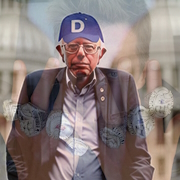|
Keith Ellison weighs in: http://thehill.com/homenews/campaign/329673-ellison-obama-deserves-blame-for-democratic-losses quote:Rep. Keith Ellison (D-Minn.) said former President Obama is partially to blame for the Democrats’ poor showing at the polls in 2016.
|
|
|
|

|
| # ? May 2, 2024 20:44 |
|
obama is terrible and i hope he fucks off too since it's obvious now he's just as poison to the dems as hillary
|
|
|
|
Dmitri-9 posted:Keith Ellison weighs in: Sounds about right. I like Obama a lot too but not focusing on down ballot races in the last 8 years really killed us.
|
|
|
|
Condiv posted:obama is terrible and i hope he fucks off too since it's obvious now he's just as poison to the dems as hillary Yes, which is to say, not poisonous at all. Hillary would have won against someone who didn't inflame the GOP's racism like Trump. Even being a woman wasn't enough to bring her down. Hillary and Obama are tied for the best candidate the Democrats have put forward since... Kennedy? Roosevelt? And our best candidate lost against their worst candidate. Our country is so hosed.
|
|
|
|
21 Muns posted:Yes, which is to say, not poisonous at all. Hillary would have won against someone who didn't inflame the GOP's racism like Trump. Even being a woman wasn't enough to bring her down. Hillary and Obama are tied for the best candidate the Democrats have put forward since... Kennedy? Roosevelt? And our best candidate lost against their worst candidate. Our country is so hosed. Why would you come to this conclusion about Hillary? I don't think Trump got many more votes than a "normal" GOP candidate. At best you could say Hillary was average (as a candidate, ignoring her bad campaign). Are you looking at the raw total of votes instead of votes as a percent of the population or something? edit: To elaborate a bit, from what I understand the numbers do not support a "Trump won because he brought out all the racists" interpretation of the election. A lot of racists voted for Trump, but that's mostly just because Republicans are racist and Republicans voted for the Republican candidate.
|
|
|
|
jeepers creepers, how can anyone list hillary clinton as "one of the best democratic candidates in half a century" her campaign was in turmoil the moment she announced. loving bernie sanders almost beat her hillary, rightly or wrongly, has too much baggage and people around the country already have an extremely dichotomous view on her. she never, ever should have run
|
|
|
|
Yeah like regardless of how bullshit the scandals around her were, enough people believed in them that she was way too damaged even before the primary started. The whole FBI thing could have easily gone against her worse than it did and that alone should have given everyone pause about sending her against any Republican.
|
|
|
|
|
"Clinton would have won!" is a new hot take i gotta admit. as great or as terrible of a president clinton would have been (depends on how much you believed her campaign policies) it is beyond a shadow of a doubt that hillary is a dogshit candidate.
|
|
|
|
RaySmuckles posted:jeepers creepers, how can anyone list hillary clinton as "one of the best democratic candidates in half a century" Considering how pathetic most of the last fifty years worth of Democratic presidential candidates have been, it's a fairly credible claim.
|
|
|
|
Main Paineframe posted:Considering how pathetic most of the last fifty years worth of Democratic presidential candidates have been, it's a fairly credible claim. I mean, Bill for one.
|
|
|
|
Main Paineframe posted:Considering how pathetic most of the last fifty years worth of Democratic presidential candidates have been, it's a fairly credible claim. Bill and Obama were good candidates I distinguish "candidate" from "president"
|
|
|
|
bill was a guy you would have a beer with and so was obama, that's the bar for a good candidate in america
|
|
|
|
I wish someone would have had a beer with W during his campaign.
|
|
|
|
Typo posted:Bill and Obama were good candidates Yeah, but that's pretty much it. The rest of the last fifty years of Democratic presidential candidates are mostly losers like McGovern and Dukakis.
|
|
|
|
21 Muns posted:Yes, which is to say, not poisonous at all. Hillary would have won against someone who didn't inflame the GOP's racism like Trump. Even being a woman wasn't enough to bring her down. Hillary and Obama are tied for the best candidate the Democrats have put forward since... Kennedy? Roosevelt? And our best candidate lost against their worst candidate. Our country is so hosed. Clinton was not a good candidate. She's barely been able to win any elections in her entire political career.
|
|
|
|
someone with favorability hovering near 40 and unfavorability at 50+ is not a good candidate
|
|
|
|
Alienwarehouse posted:Are you loving kidding me? Reread that post. Obama was elected in two landslides. It was realized in 2016 that the Democrats simply failed to do anything about neoliberalism, globalization, automation, and even the failing social safety net. People are suffering in record numbers, and that incredibly out-of-touch imbecile Hillary Clinton had to gall to say "America is already great!" for months. Are you one of those idiots that says Hillary lost due to sexism as well, despite evidence of her lovely neoliberal economic philosophy failing worldwide for the last fifteen years—which she STILL decided to campaign on? The Democratic Party itself is the one that's been supporting neoliberalism, globalization, automation, and killing the failing social safety net. See: Bill Clinton. Though really, it started with McGovern targeting the white collar professionals in the seventies over the poor and unions.
|
|
|
mcmagic posted:I agree with this but there is no one else in the GOP who could've done it in 2016 other than Trump. I got laughed at by my friends throughout the entire primary and general election campaigns for saying that Donald Trump was the only republican candidate that could defeat Hillary, simply due to his anti-free trade and somewhat anti-war rhetoric. Hillary would have steamrolled Little Marco and Lyin' Ted like like a tank rolling through no man's land. In retrospect, how loving amusing is it that Hillary had her connections in the media give Trump more airtime than everyone else, because she believed otherwise? Mister Facetious posted:The Democratic Party itself is the one that's been supporting neoliberalism, globalization, automation, and killing the failing social safety net. See: Bill Clinton. I know, but it became painfully obvious even to the politically inactive masses by 2016.
|
|
|
|
|
Pedro De Heredia posted:Clinton was not a good candidate. she's never won an actual race and will go down in history as the worst candidate of all time. don't forget she's the first one in decades to blow a fundraising advantage
|
|
|
|
Alienwarehouse posted:I got laughed at by my friends throughout the entire primary and general election campaigns for saying that Donald Trump was the only republican candidate that could defeat Hillary, simply due to his anti-free trade and somewhat anti-war rhetoric. Hillary would have steamrolled Little Marco and Lyin' Ted like like a tank rolling through no man's land. In retrospect, how loving amusing is it that Hillary had her connections in the media give Trump more airtime than everyone else, because she believed otherwise? Rubio prob would have outright won the popular vote Trump won with basically the same Republican coalition which voted in Romney, what killed the Democrats was lower voter turnout than Obama
|
|
|
|
mastershakeman posted:she's never won an actual race and will go down in history as the worst candidate of all time. don't forget she's the first one in decades to blow a fundraising advantage I got remember that, I have a friend who still thinks she was a great candidate and things aren't that bad because democrats won the popular vote and the rust belt states that went Trump weren't lost by "that much." The lesson he is taking from this is that Democrat messaging is working. I have learned from him that I do not want to ever read Wonkette.
|
|
|
|
Hillary Clinton has won two Senate elections in goddamn New York, and she might not even have won the first one if Giuliani didn't happen to self-destruct in a spectacular fashion and had to be replaced on the ballot by some no-namer. Hence I never really understood the idea that she was some expert at winning elections.
|
|
|
|
Alienwarehouse posted:I got laughed at by my friends throughout the entire primary and general election campaigns for saying that Donald Trump was the only republican candidate that could defeat Hillary, simply due to his anti-free trade and somewhat anti-war rhetoric. Hillary would have steamrolled Little Marco and Lyin' Ted like like a tank rolling through no man's land. In retrospect, how loving amusing is it that Hillary had her connections in the media give Trump more airtime than everyone else, because she believed otherwise? One of Hillary's bigger mistakes was to assume that Trump's racism would drive away moderate/independent voters and motivate minorities, so instead of pushing her own message or countering Trump's message, she could just point at the racism. This is especially apparent in outside group spending, where something like 98% of the ad time bought by outside groups that supported Hillary was negative advertising against Trump. This led to situations where Trump would state his economic message, and rather than responding with her own economic message, the Hillary campaign chose to draw even more attention to Trump's economic message by pointing out that it was racist. Unfortunately, offered the choice between a racist economic message and no economic message, voters didn't find Hillary's strategy particularly compelling.
|
|
|
|
To be fair it's hard to have strong messaging on economic issues when your own campaign can't even figure out why you're running in the first place.
|
|
|
|
lolquote:Former President Barack Obama has agreed to speak at a Wall Street conference for $400,000, according to a new report.
|
|
|
|
The Wall St speeches are just icky. Not that I would turn down 400k...
|
|
|
|
I am curious what it will be about.
|
|
|
|
|
Main Paineframe posted:One of Hillary's bigger mistakes was to assume that Trump's racism would drive away moderate/independent voters and motivate minorities, so instead of pushing her own message or countering Trump's message, she could just point at the racism. This is especially apparent in outside group spending, where something like 98% of the ad time bought by outside groups that supported Hillary was negative advertising against Trump. This led to situations where Trump would state his economic message, and rather than responding with her own economic message, the Hillary campaign chose to draw even more attention to Trump's economic message by pointing out that it was racist. Unfortunately, offered the choice between a racist economic message and no economic message, voters didn't find Hillary's strategy particularly compelling. apparently the reason why she didn't was because she thought the email scandal was destroying every attempt at her trying to bring up a positive message, so she thought she was stuck with mudslinging and hope her mudslinging is outweigh the emails
|
|
|
|
Typo posted:apparently the reason why she didn't was because she thought the email scandal was destroying every attempt at her trying to bring up a positive message, so she thought she was stuck with mudslinging and hope her mudslinging is outweigh the emails Ugh, in a way this is even more damning. I don't know if I'm just too low level or too insignificant, but my first impulse in this case would be to say 'gently caress it, I'm still going with why I should be President. gently caress this guy. I'm talking about what I"m good at. What I can bring to the table." I know it's simplistic...but drat.
|
|
|
|
shrike82 posted:lol jesus
|
|
|
|
TyroneGoldstein posted:Ugh, in a way this is even more damning. I don't know if I'm just too low level or too insignificant, but my first impulse in this case would be to say 'gently caress it, I'm still going with why I should be President. gently caress this guy. I'm talking about what I"m good at. What I can bring to the table." Turns out that the only thing Hillary could bring to the table was going negative. It's kinda unsurprising in hindsight. She tried to go negative on Obama in 2008 but it wouldn't stick, and she did the same thing with Bernie in 2016 except that she was successful that time.
|
|
|
|
Cerebral Bore posted:and she did the same thing with Bernie in 2016 except that she was successful that time. she actually didn't really: the reason why she didn't though was because her team was very very sure it was going to backfire So Bernie went negative on her first tbf
|
|
|
|
Typo posted:she actually didn't really: the reason why she didn't though was because her team was very very sure it was going to backfire GOD FORBID Bernie run an actual campaign. What a dick.
|
|
|
|
Typo posted:apparently the reason why she didn't was because she thought the email scandal was destroying every attempt at her trying to bring up a positive message, so she thought she was stuck with mudslinging and hope her mudslinging is outweigh the emails Not just the emails, but anything that looked bad. Every time something negative about her came up, her campaign dropped all attempts at marketing her positively and bought a bunch of ads to highlight Trump's negatives. It happened after she collapsed at the 9/11 memorial, for instance.
|
|
|
|
Typo posted:she actually didn't really: the reason why she didn't though was because her team was very very sure it was going to backfire Did you miss the legion of Hillfolk in the media trying their damndnest to portray Bernie and everybody who supported him as super racist and/or sexist and Hillary happily going along with it? It's not as if negative campaigning has to stop at the doors of your office, in fact it's usually more effective if some outside party is doing it for you. EDIT: I mean, hell, the same people literally tried to do the same to Obama in 2008. At some point basic pattern recognition ought to kick in.
|
|
|
|
Main Paineframe posted:Not just the emails, but anything that looked bad. Every time something negative about her came up, her campaign dropped all attempts at marketing her positively and bought a bunch of ads to highlight Trump's negatives. It happened after she collapsed at the 9/11 memorial, for instance. Are we repeating InfoWars talking points as if they were real, now?
|
|
|
|
Need a one week ban. Oh and I leave you with noted wonderful liberal Ezra Klein speaking the wonders of the authoritarian city state of Singapore medical system. Note how I said it is an authoritarian city state. Never once does Ezra mention this in the article. (Frankly I would argue this is because Singapore is ezra kleins fever dream of the his ideal place to live. ) Love these WONDERFUL liberals. http://www.vox.com/policy-and-politics/2017/4/25/15356118/singapore-health-care-system-explained A idiot gave Paul Ryan blow jobs posted:
Also lol at his truth is in the middle horseshit. Crowsbeak fucked around with this message at 17:45 on Apr 25, 2017 |
|
|
|
21 Muns posted:Are we repeating InfoWars talking points as if they were real, now? yes i'm sure the guy who got this as redtext "I'm a big baby who can't accept the fact that maybe if I hadn't shamed all the Bernie supporters during the primary they would've help mi abuela win." is a fan of attacking hillary with infowars talking points
|
|
|
|
Crowsbeak posted:Need a one week ban. Oh and I leave you with noted wonderful liberal Ezra Klein speaking the wonders of the authoritarian city state of Singapore medical system. Note how I said it is an authoritarian city state. Never once does Ezra mention this in the article. (Frankly I would argue this is because Singapore is ezra kleins fever dream of the his ideal place to live. ) Huh? In Singapore THE GOVERNMENT CONTROLS HEALTH CARE PRICES AND THE MEANS OF HEALTH CARE FOR THE MAJORITY OF PEOPLE!!!! You can't talk about their system without that fact in context and as usual, american conservatives are craven morons when they do so. LOL @ them talking about "market forces" in that article. Morons.
|
|
|
|

|
| # ? May 2, 2024 20:44 |
|
Hillary Clinton ran on this and also this. All this bullshit, the latter as especially, made me want to vote for Trump out of spite. They clicked into something that very much resembles the tobacco industry's government mandated "stop smoking" campaigns that subversively make you want to smoke to rebel against the campaign. The idea that the behavior of children is going to be altered by the President being foul mouthed or being on the record as liking big tits. Good grief. If you thought Trump saying "bomb the poo poo out of them" was going to make your child a degenerate, I'd hate for your kids to grow up during the Nixon tapes. mcmagic posted:GOD FORBID Bernie run an actual campaign. What a dick. Bernie said "excuse me!" and interrupted her. What a chauvinist who can't stop mansplaining. Bernie is truly the worst and I'm going to ignore that DONALD FRIGGIN TRUMP would do all that and more. Shame on Bernie for not treating a woman with kids gloves. She's only been debating men most of her life. Craptacular! fucked around with this message at 20:43 on Apr 25, 2017 |
|
|


























